How Simon Amstell went from asking Craig David about sausages to launching his debut feature film
A long conversation with the former GamesMaster contestant
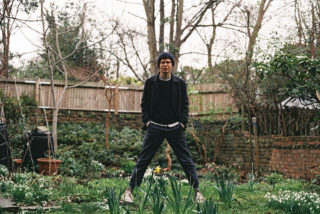
A long conversation with the former GamesMaster contestant
Powerful images from Simon Amstell’s past include him asking Craig David what his favourite genre of sausage is; him shouting questions at Lemar from the other side of the world’s largest car park; him interviewing the Strokes via a horse named Richard; and him weirding out Gwen Stefani when he asked if she wanted to put her hand in his pocket full of cheese at the Brit Awards. Popworld was full of brilliantly surreal moments like this, and Amstell’s ultra sarcastic take on the role of television presenter only snowballed during his time hosting Never Mind The Buzzcocks, peaking, it seemed, most famously when Preston from the Ordinary Boys walked off the show halfway through recording an episode.
For some, Amstell may forever be (fondly) rendered in those two images, even if they did end in 2006 and 2009, respectively; while plenty of others have been getting to know something resembling the real Simon Amstell over the ten years that have followed. During that time his body of work has been selective but increasingly personal, from his BBC Two sitcom Grandma’s House – where his mother, played by Rebecca Front, seemed to constantly be trying to persuade him to go back to a career of fame based on upsetting popstars (“you were good at that,” she’d say) – to his standup show ‘Numb’, which zeroed in on his real life anxiety.
His latest project – his biggest yet – continues to draw directly from the life he’s led. Benjamin, Amstell’s first feature film, opened in cinemas and on digital platforms on March 15th. It features a soundtrack from James Righton (also available now), and tells a beautifully anxious story of a young gay filmmaker trying to replicate his previous career success and learn to finally share his life with someone else – in this case, a young French musician named Noah. It is very funny and as dry as you can probably imagine; heartfelt, too; and, obviously, repeatedly awkward.
Although Amstell didn’t cast himself in the film, he admits that the titular character is basically him from ten years ago. I invited him to my house to talk more about that, how he went from asking Craig David what his favourite genre of sausage is to directing movies, and all other things related to Benjamin.
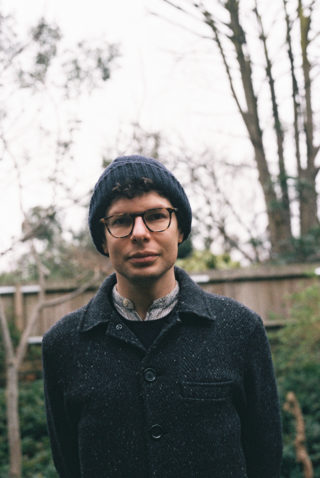
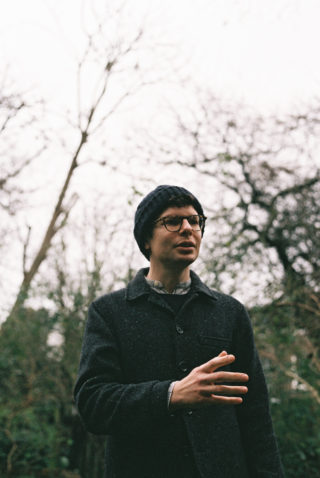
Congratulations on Benjamin. I saw it at the weekend and loved it. How are you feeling about releasing your first feature film?
Yeah, I’m weirdly calm. I think because I like it. And also when we premiered it at London Film Festival the reaction was so good. Everyone laughed and seemed to feel things at all the right times. Unlike Benjamin, who is an anxious lunatic – or a bit like the anxious lunatic that I was a few years ago – it’s not life or death to me.
Did you study film?
No. I did Media Studies A Level, and part of that was film, but no, I didn’t go to film school or university at all. I’m very unqualified. Could you tell?
No, not at all.
Well, that’s ok then. I definitely worked with people who had been to film school. And all the actors had learned to act. In Media Studies I remember watching Blade Runner and learning the words ‘juxtaposition’ and ‘semiotics’, and that was all I needed to make a feature film. So no, I didn’t go to film school, but I feel like, in terms of writing it, I’ve been writing things for a long time – whether it’s sketches or jokes or longer stories or bits of very personal standup – so that didn’t feel like such a leap… I don’t know what to say… I didn’t go to film school… but I could. I could still go if I wanted to.
I suppose what I meant to say was how did you get into directing?
James Righton, who did the music for the film, asked me to direct a music video for one of the songs from his first solo album under the name Shock Machine. We got on really well and I thought that he’d be a lovely person to work with, should, at some point, a film need some music. And I directed a film for the BBC called Carnage [set in 2067, when the UK is 100% vegan].
What’s nice for me about directing is that I am finally allowed to be the person that I’ve been all along. Which is the guy who is in charge. Y’know, I’ve been working in TV from about the age of 18, and when I first started I had to constantly find a way to make the thing that I was doing the way I wanted it to be, because officially I wasn’t the person who should be making those decisions. So it’s official now – I’m the guy who gets to say yes or no to things.
So did you always want to be the director, then? Was that the end goal?
I’m trying to think… I went to a Saturday morning stage school when I was 13, and I remember writing for the annual variety show two short plays, because I thought then I’d be able to give myself a good part… Also, when I was 10, my little sister was born and a camcorder was purchased to document her growth, and I stole that camcorder and started making little films with my brother, of puppet shows and things. Maybe that’s the moment.
I was fixated on television, initially, although the references for the film were Woody Allen and John Cassavetes, in terms of the metropolitan, anxiety-fueled humour and the rawness of the performances in Cassavetes’s films – I thought if I can get some of that in this, that’d be quite good.
This is a little bit of a spoiler, but your film starts inside Benjamin’s own film, which is clearly trying too hard. When the film started, I thought I’m not sure I’m going to make it through this, and I’ve got to meet you today to talk about it. So I was very relieved when it transpired that that was not your film.
I know, I know. Imagine being sat in the audience watching it with people.
Did you feel their sense of relief at that same moment?
Yes. There was a big laugh when the first title card came up, I think because the character said something funny, but ultimately because it was such a relief that the film they’d been watching up to that point wasn’t the film.
You mentioned you were fixated on television initially. It is true that when you were a kid you went on GamesMaster?
It is, yeah. I was 12 or 13. I feel like I lost a tennis game very badly, to someone from Romford. My team was the Essex Allstars and his team were the Romford Raiders. That’s my memory of it. And he did his game first and got a very good score, and he said to me, very aggressively, ‘beat that!’, which really threw me. But I wasn’t good at games.
But you were on GamesMaster?
Partly I just wanted to be on the television, but also I just wanted to see how television worked. So I would often go and watch TV shows being made, as an audience member, to see cameras moving across the floor. It was so silly – we went to see the Lottery once, which was 15 minutes long. My mum took me. It was Carol Vorderman presenting it, and I think Dolly Parton performed. And then they read out the lottery numbers and we went home.
I suppose similarly, when I decided that I wanted to direct this film, I started turning up to different sets, to check I was capable of doing it, and I went to one film set in New York where I witnesses such a badly written film being made, by a director that everyone seemed to dislike, and I thought, oh, I think I can write something better than this, and get on with people better. It kind of took the mystery out of it for me.
What kind of director are you?
A brilliant one! … Maybe I’m an actor’s director. I really like working with actors and finding people who are brilliant, and letting them do the thing that they can do. I tend to just say ‘go nuts’ to people. With James for the soundtrack as well; he asked me what it should be and I said, ‘I don’t know – just go nuts’.
So you’re not a director who shouts at everyone?
There’s no shouting. That would just be horrific. You’d just end up with really bad performances, I would think. It’s so important for the actors to feel safe, so they can reveal themselves on screen. The idea that you’d be screaming at them is so insane.
What made you decide to cast someone else as Benjamin rather than yourself?
Well, I wrote it five years ago, and I was thinking then that it would make sense if I was Benjamin because I’d written him in my voice. But then, having directed a couple of things that I wasn’t in, I felt very much at home directing rather than being in front of the camera. It was a real relief meeting Colin Morgan who made me laugh and also made me feel for him, which meant that I could tell this story without needing to be in it, and potentially make the film worse. I’m much more comfortable directing – acting was always a struggle.
You were good in Grandma’s House, though.
Well it depends who you ask. I don’t know what would have to happen for me to do that again.
It’s an obviously thing to say, but it seems like there’s a lot of you in the character of Benjamin.
I wrote it trying to figure out what was wrong with me. What had happened in my 20s? What were some of those relationships about? What was I doing that meant that I wasn’t finding love very easily, or very easy? And I learned through writing the script that I was someone who was terrified of intimacy. Because that’s Benjamin’s problem – he’s a person who is so obsessed with how people perceive him, as this filmmaker guy who made a great film once, that he’s unable to do anything else. He’s a person who’s used to going to a lot of effort in order to get some love. He’s not used to just being present with another human being without feeling like he has to be someone better. And that’s his journey – this beautiful musician character, Noah, comes and very patiently undoes all of his manic ego.
And how about the character of Stephen – is there any of you in him?
Well, he’s a standup comedian, so I guess there is a bit.
Because he’s also an awkward guy who seems to be grappling with anxiety.
Yeah, that’s true. Yeah, I’m definitely in Stephen and Benjamin. Benjamin is hirer status, because he made something once that was a real hit, and Steven has never had a hit. One of Steven’s lines is, ‘all that’s happening is I’m getting older.’
He says that just after the scene where he bombs on stage, which is probably the movie’s most awkward moment. Have you ever bombed as badly as that?
Yeah, I think worse. Because he’s quite self destructive. It was going quite well and he kind of ruins it. And it’s because he’s not there joyfully. He’s there trying to heal a wound. And that was always the problem for me. It used to be that when I was on tour it wouldn’t feel completely satisfying, a show going well. That wouldn’t be enough. There would have maybe been 3000 people all in a room laughing and then they would leave. And if you’re not on that stage already feeling whole, but rather trying to get an audience to fill some void in you, even if the show is the best you’ve ever done, at some point they leave and you’re alone again. And the contrast is too horrific. So I’ve self-destructed like that on stage. I think it’s because you unconsciously know that the love that you’re receiving is conditional; that you have to do this trick in order that they stay, and there’s a part of you that thinks, ‘why do I have to make this much effort in order for you people to like me?’ And then there’s some aggression towards the audience because fuck them for making you do this party trick. But once you get well, then it’s ridiculous, because this is the thing that you love doing, and they’re here because they want to be here, and it really is just a room full of love. And hopefully you’ve got some love in your real life so when they leave you’ve got something that means that you don’t require them anymore.
How, then, do you deal with people in street saying that they love you? Is it hard for you to accept that they’re telling the truth?
It’s always different. It can range from people saying, ‘oh, you’re that guy; you’re that guy’. They don’t know who I am, but they’re pointing out that they’ve seen a guy. It can go from that to, ‘this very specific thing that you did was very important to me’. But I can see the differences now. At the end where someone has been really effected by something, I really appreciate hearing about that connection. It makes me feel less alone in the world. I feel useful, and it’s like, ‘oh, that’s the reason to be doing this.’ And then the other guy is nothing to do with me. That’s just a guy who’s recognised an image that he saw previously.
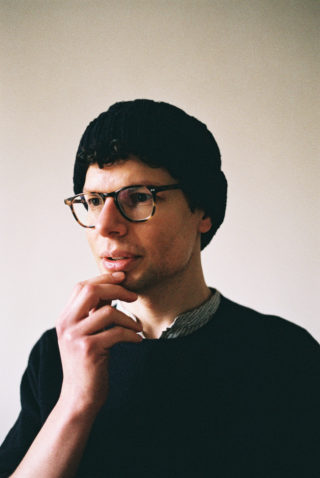
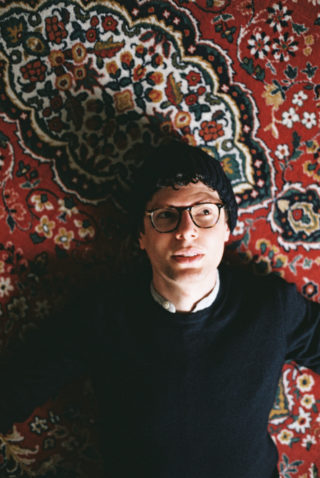
Are any of the scenarios in the film autobiographical?
Definitely all of the emotion is emotion that I have felt. There’s nothing in there where I wasn’t sure what the character would be feeling but I’ve sort of guessed. I don’t trust anything unless I’ve felt it. There are a few scenes that are similar to things that have happened in my life, but that’s quite rare. It’s more that I’ve wanted to express something I’ve felt.
So you’ve not been mistaken for a competition winner before [as Benjamin is on a film set]?
No, but I have felt that feeling that he has, which is of being not special in that moment when you thought that you were.
At what age did you start doing standup?
Thirteen. I retired when I was eighteen and started again when I was twenty-one.
Thirteen! Jesus Christ.
I know.
At what point did you arrive at the style people would now recognise as yours?
Between 13 and 18 I did a few gigs in some variety shows, and I entered some competitions in comedy clubs. I was a weird child, so it was like seeing a novelty act, although I was very committed to the craft – I was just in a child’s body.
I was Ben Elton for a while. And I was Eddie Izzard for a while. And then, at 21, I would say it took me about 5 years on the open spot circuit to find my voice. After then I felt like I knew how to write material.
I was lucky enough to have some magic mushrooms on the day of a gig. And I thought they’d worn off but they hadn’t, and something happened. I was doing the same jokes that I was doing before but there was a looseness and silliness that came through me, and I thought, oh wow, this is a more joyful way of performing. Obviously I can’t take magic mushrooms every time, but I think I can remember this feeling. I think I realised that I was a bit ridiculous and that’s why it was funny, whereas before I was too in it – I was too protective of myself.
I can’t imagine that you’d every want to go back to presenting, but is there anything from those days that you miss?
There’s something about the atmosphere of a studio. But It feels like something I did as a kid. When we premiered Benjamin, there was a Q&A afterwards, and someone asked Joel Fry [who plays Stephen] what I was like as a director, and I quite like what he said – that I seem like someone who’s lived several lives. And that really rang true – I guess I started doing stuff very young, so now, at 39, some of that stuff feels like a whole other lifetime, where I was such a different person. I feel very grounded in what I’m doing now. It makes sense. I don’t feel like I’m trying to get to anywhere else. I feel like I’m doing the thing I’m supposed to be doing.